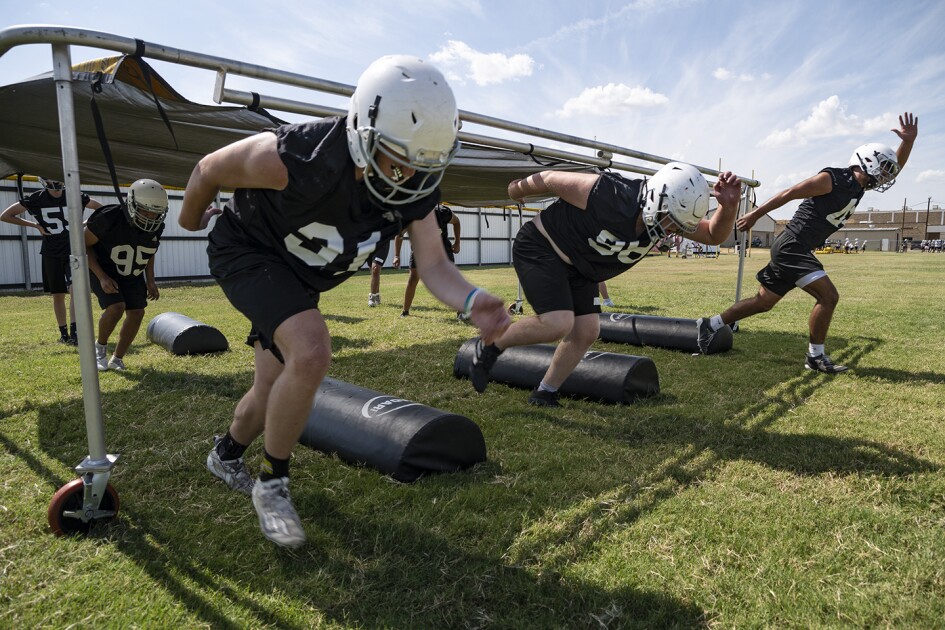Updated: This article has been updated to include comments from White House Press Secretary Jen Psaki.
A group representing local school boards says the federal government should review violence and threats involving schools to see if they violate federal statutes about domestic terrorism and hate crimes, amid ongoing tension and anger about COVID-19 policies.
In a Wednesday letter to President Joe Biden, the National School Boards Association says statutes like the Gun-Free School Zones Act and the USA PATRIOT Act, a law passed shortly after the Sept. 11, 2001 attacks on the World Trade Center and the Pentagon designed to halt terrorism, should be enforced if necessary against crimes and acts of violence targeting K-12 officials. The school board group says the classification of these acts could be “the equivalent to a form of domestic terrorism and hate crimes.”
The school boards group, which cited several newspaper articles about angry demonstrations at school board meetings and other incidents around the country, also told Biden that the U.S. Postal Service should intervene against cyber-bullying and threatening letters that have targeted students, teachers, administrators, and others.
“These threats or actual acts of violence against our school districts are impacting the delivery of educational services to students and families” as schools attempt to address the pandemic’s effects on learning, the school boards association stated in its letter to Biden.
The NSBA letter also cited anger about critical race theory as another factor fueling disruptions and venom toward educators. An EdWeek Research Center survey conducted last summer found that more than 9 out of 10 teachers said they had never taught critical race theory to their students.
The letter was signed by NSBA President Viola M. Garcia and interim Executive Director and CEO Chip Slaven.
Asked by Education Week whether his group thought arrests and charges by local law enforcement were an insufficient response to the situation, Slaven said that “safety and deterrence” are NSBA’s main goals in seeking federal assistance. The circumstances call for a coordinated response at the local, state, and federal levels to ensure school officials can focus on their jobs, he said.
“These incidents are beyond random acts. What we are now seeing is a pattern of threats and violence occurring across state lines and via online platforms, which is why we need the federal government’s assistance,” Slaven said in an email.
In response to a question about NSBA’s letter at a Thursday press conference, White House Press Secretary Jen Psaki called the targeting of school board officials “horrible” and said the administration is exploring options concerning the situation. But she indicated that local law enforcement bore a lot of the responsibility for ensuring the safety of school board members and others.
“We’d encourage individuals to report any threats they face to local and state law enforcement agencies,” Psaki said.
Education groups sound the alarm amid dissent over masks and quarantines
The request for help from Washington is the latest signal that education groups are deeply concerned about backlash to policies like mask mandates and mandatory COVID-19 quarantines that schools have implemented early this school year, as principals, school boards, and other K-12 officials have faced anger and sometimes worse in their communities.
The feud over masks in particular, has become a national political issue. The Biden administration has launched civil rights probes into state bans on local school mask mandates, and has repurposed a school safety grant program to help offset penalties imposed on districts that defy state bans on such mandates.
In mid-September, the National Association of Secondary School Principals called on the federal government to protect school leaders from threats and violence. The group asked the U.S. Department of Education to issue guidance about the authority of school leaders “to protect themselves and our ability to remove or ban hostile parents and individuals from school grounds who threaten our safety.”
The education department has yet to issue such guidance. U.S. Secretary of Education Miguel Cardona has repeatedly said that educators as well as students and others deserve to be protected from COVID-19 and made to feel safe during the pandemic, and that political considerations should not trump local health and safety protocols such as masking. He has also backed state and local vaccination requirements for eligible students.
On Sept. 22, the NSBA, along with AASA, the School Superintendents Association, issued a joint statement condemning “online and in-person threats, abuse and harassment.” AASA President Daniel Domenech said that while his group respected the right of free speech, “We cannot—and will not—tolerate aggression, intimidation, threats and violence toward superintendents, board members and educators.”
It’s not clear exactly how often public dissatisfaction about mask rules and other COVID-19 policies in schools has boiled over into threats and violent disruptions. One such prominent incident involved three men who came to an Arizona elementary school with zip ties seeking to detain the principal; those men were arrested and charged with trespassing.
In its letter to Biden, the school boards association also cited the arrest of an Illinois man for aggravated battery and disorderly conduct during a school board meeting, as well as a person’s Nazi salute during two board meetings in Michigan, among other disruptions and violence involving schools.
In addition to the PATRIOT Act and the Gun-Free School Zones Act, the NSBA asked for a review of such incidents under the Matthew Shepard and James Byrd Jr. Hate Crimes Prevention Act, the Violent Interference with Federally Protected Rights statute, and the Conspiracy Against Rights statute. The group asked that the Departments of Education, Homeland Security, and Justice conduct the review, with the assistance of the Federal Bureau of Investigation.
The NSBA said such an effort could also help local officials monitor threats and other potential illegal activity. It also asked for several agencies to assess the risk to students, staff, K-12 leaders, and facilities.









